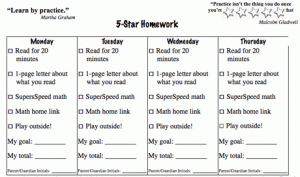Kitchen Table Connections (or 5 Ideas to Re-Envision Homework)
Rather than mindless or irrelevant busywork, homework should invite students to learn what they can from their home life and take it back to school.
I don't need to read the newspapers or the latest Edutopia guest blog to encounter the great homework debate. I need only sit down at my kitchen table on any given afternoon to identify with both sides of the argument. On one hand, I can see that homework extends learning outside the classroom and provides extra opportunities for practice and scholarship. But I can also sympathize with opponents of homework who argue that it cuts into family time and is too often meaningless and rote.
I'm an educator and a mom of four school-aged children. I live this debate. But, because I wear both hats, I've learned from experience that there's great potential in homework when the learning flows in both directions. Too often, homework is only about practicing at home what students have learned at school. But, in my view, homework becomes the most meaningful when it invites students to learn what they can from their home life and take it back to school. Here are some of the insights that I've gleaned from experiences at my kitchen table.
1. Foster Encounters
One of my favorite homework assignments of all time invited my second-grade son to ask someone for their story about living through a major weather event. At a young age, he and his classmates had to develop questions and seek answers while practicing their communication and interpersonal skills. Other children in his class talked to neighbors down the street, Skyped with grandparents in their native languages, and reminisced with parents about hunkering down in the basement. No two students came into class with the same answers to report. They all made connections between their life at school and their life at home. Why don't more homework assignments require students to encounter their community and learn from people they know? Teachers, keep these kinds of assignments coming!
2. Promote Metacognitive and Organizational Skills
I appreciate it when homework isn't just about the assignment, but explicitly about life skills as well. When my oldest son came home two years ago with a new homework "system," it didn't take long for me to realize its value. Each Monday, his folder included a chart with the daily homework assignments for the week. Each assignment had a little empty square next to it begging to be filled with a check mark. Now my son had a tool at home to help him measure whether he'd taken care of business. It was so simple, and yet so effective. The teacher tallied the class check marks to reinforce the value of practice and effort.
Here’s a great example of this universal homework system in action in a first-grade classroom:

3. Value What's Also Important
Several teachers at the school are now using the checkbox homework system, and the charts are getting more creative. Each day includes an empty box that students get to check for playing outside! What other habits and skills can we value through homework?
- Say "thank you" to someone that you encounter this evening.
- Sing a song.
- Watch the news for five minutes.
4. Build Stamina for Important (Not Mindless) Skills
Every Thursday for 26 painful weeks, my kindergarten-aged child had to find ten items from a magazine or newspaper that started with the letter of the week. It was sheer torture and, I would argue, of minimal value. It's an example of the mindless or rote assignments that critics of homework love to cite.
In contrast, inspired by the work of Professor Lucy Calkins at Columbia University, my son's third-grade teacher decided to shake up her language arts homework. Every night's assignment was the same. Students had to write her a personal letter about something that they read that day at home. Their letter could be about a novel, a magazine article, or a catalogue that caught their eye. The letters never came home with red pen marks. It wasn't about perfect mechanics. It was about communicating with a reader -- their beloved teacher -- and developing stamina for writing.
By the end of the year, my son could churn out a one-page letter in a matter of minutes. Writing became so natural to him that he had the excess energy to fine-tune his mechanics. In the spring, I spoke to the teacher about how much growth I saw in his writing skills because of the letter-writing homework. She replied, "And didn't we get a great window into his world when we read them!" Yes, oh yes, we did! Once again, homework encouraged connection.
5. Encourage Conversation
I love Friday afternoons. The school week is done. For our family, it's a time to hang up backpacks and briefcases and enjoy an evening together, in part, because there's no homework to think about. But one year, through her blog, one of my children's teachers began sending home Friday homework for the parents! It usually began like this: "Ask your children the following three questions this weekend..." What followed were specific questions related to what the class had learned, wrestled with, or laughed about; or fun questions about a visitor, story, or project. Gone were the days when I asked, "So, what did you do at school today?" and my children mumbled, "Nothing." Those simple discussion starters (that likely took the teacher just moment to write) gave me precious opportunities for conversation with my child.
No doubt homework can be a chore. But at its best, homework can also build a bridge between students' home lives and school lives. Let's start designing more homework to strengthen these connections.
